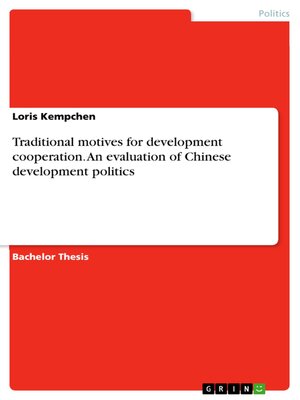Traditional motives for development cooperation. an evaluation of Chinese development politics
ebook
By Loris Kempchen

Sign up to save your library
With an OverDrive account, you can save your favorite libraries for at-a-glance information about availability. Find out more about OverDrive accounts.
Find this title in Libby, the library reading app by OverDrive.



Search for a digital library with this title
Title found at these libraries:
| Loading... |
Bachelor Thesis from the year 2015 in the subject Politics - Topic: Development Politics, grade: 1,7, University of Potsdam (Wirtschafts- und Sozialwissenschaftliche Fakultät), language: English, abstract: Since the end of WWII and the movement towards independence of former colonies, development cooperation has become an important issue for world governments as well as for academicians. Different theories about the causation of development and underdevelopment have emerged since the 1950´s and have been the subject of fervent discussions within the academic community. A multitude of theories and approaches have been the result of these discussions and can be used to understand development and its related implications. This thesis will provide an overview of the most relevant theories of development and show how they are the product of their respective time. The works of the most influential authors of the respective theories will support the theoretical discussion in order to offer the framework for the deduction of motives. This thesis focuses only on the theories that examine state or actors behavior in development cooperation in general, in order to elucidate the motives of these states or actors. A y-centered research approach (Gerring, 2006) has been used in order to answer the following question: "Can China´s motives for development cooperation be explained by the models of the classical theories of development?" The dependent variable (y) is China´s motives and the independent variables (x1, 2, 3, 4,n) are the motives derived from the classical theories. This paper investigates whether there is a correlation between these traditional motives and the Chinese motives or whether the Chinese motivations cannot be explained by the classical theories. The last part of this thesis is a discussion of the following hypothesis, which reflects my research questions and the relationship of the variables: Chinese motives highly correlate with the motives described by traditional development theories. The comparison, that has been deduced, might not be immediately evident to the reader, seeing that this is a comparison of motives derived from a theoretical discussion (chapter 2 and 3), with motives that were derived from empirical observations (chapter 4).






